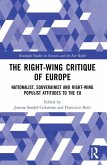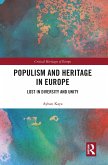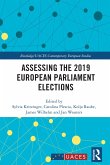The Right-Wing Critique of Europe analyses the opposition to the European Union from a variety of right-wing organisations in Western, Central and Eastern Europe.
In recent years, opposition to the processes of globalisation and the programme of closer European integration, understood as a threat to the sovereignty of individual member states, has led to an intensification of Eurosceptic sentiments on the Old Continent. The results of the European parliamentary elections in 2014 and 2019, the Brexit referendum and electoral results in different European countries are all testament to the considerable growth of radical populist-nationalist and conservative-sovereignist movements and parties. The common idea that binds these groups, both in Western Europe and in Central and Eastern Europe, is a hostile attitude towards the idea of (an ever-more integrated) united Europe. These parties reject not only the project of building a European federation, but also the current model of the European Union and the values underlying its attitudes. They are united by their criticism of EU policies, in particular those concerning security, emigration, multiculturalism, gender equality and the rights of minorities, as well as economic liberalism and the common currency. However, this criticism manifests itself with varying degrees of intensity, and not all parties fit the classic definition of Euroscepticism but instead represent its mild form, Eurorealism. The authors bring together reflections on the organic and complex critique of the European Union, its policies and cultural and ideological character. The book provides a comparative analysis of this criticism at the transnational level.
This book will be of interest to researchers of European politics, the radical right and Euroscepticism.
The Open Access version of this book, available at www.taylorfrancis.com , has been made available under a Creative Commons Attribution- Non Commercial- No Derivatives 4.0 license.
In recent years, opposition to the processes of globalisation and the programme of closer European integration, understood as a threat to the sovereignty of individual member states, has led to an intensification of Eurosceptic sentiments on the Old Continent. The results of the European parliamentary elections in 2014 and 2019, the Brexit referendum and electoral results in different European countries are all testament to the considerable growth of radical populist-nationalist and conservative-sovereignist movements and parties. The common idea that binds these groups, both in Western Europe and in Central and Eastern Europe, is a hostile attitude towards the idea of (an ever-more integrated) united Europe. These parties reject not only the project of building a European federation, but also the current model of the European Union and the values underlying its attitudes. They are united by their criticism of EU policies, in particular those concerning security, emigration, multiculturalism, gender equality and the rights of minorities, as well as economic liberalism and the common currency. However, this criticism manifests itself with varying degrees of intensity, and not all parties fit the classic definition of Euroscepticism but instead represent its mild form, Eurorealism. The authors bring together reflections on the organic and complex critique of the European Union, its policies and cultural and ideological character. The book provides a comparative analysis of this criticism at the transnational level.
This book will be of interest to researchers of European politics, the radical right and Euroscepticism.
The Open Access version of this book, available at www.taylorfrancis.com , has been made available under a Creative Commons Attribution- Non Commercial- No Derivatives 4.0 license.








